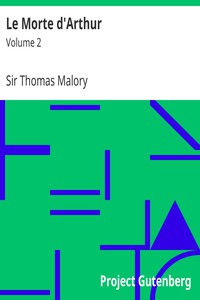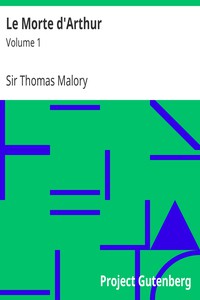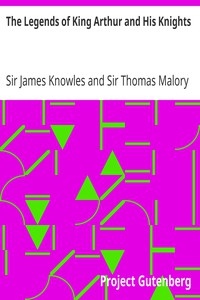Le Morte d'Arthur: Volume 2, Sir Thomas Malory [best pdf reader for ebooks .TXT] 📗

- Author: Sir Thomas Malory
Book online «Le Morte d'Arthur: Volume 2, Sir Thomas Malory [best pdf reader for ebooks .TXT] 📗». Author Sir Thomas Malory
So when this was done, this strong knight rode on his way a soft pace, and King Mark rode after him, praising him mickle; but he would answer no words, but sighed wonderly sore, hanging down his head, taking no heed to his words. Thus they rode well a three mile English, and then this knight called to him a varlet, and bade him ride until yonder fair manor, and recommend me to the lady of that castle and place, and pray her to send me refreshing of good meats and drinks. And if she ask thee what I am, tell her that I am the knight that followeth the glatisant beast: that is in English to say the questing beast; for that beast wheresomever he yede he quested in the belly with such a noise as it had been a thirty couple of hounds. Then the varlet went his way and came to the manor, and saluted the lady, and told her from whence he came. And when she understood that he came from the knight that followed the questing beast: O sweet Lord Jesu, she said, when shall I see that noble knight, my dear son Palomides? Alas, will he not abide with me? and therewith she swooned and wept, and made passing great dole. And then also soon as she might she gave the varlet all that he asked. And the varlet returned unto Sir Palomides, for he was a varlet of King Mark. And as soon as he came, he told the knight’s name was Sir Palomides. I am well pleased, said King Mark, but hold thee still and say nothing. Then they alighted and set them down and reposed them a while. Anon withal King Mark fell asleep. When Sir Palomides saw him sound asleep he took his horse and rode his way, and said to them: I will not be in the company of a sleeping knight. And so he rode forth a great pace.
How King Mark and Sir Dinadan heard Sir Palomides making great sorrow and mourning for La Beale Isoud.
Now turn we unto Sir Dinadan, that found these seven knights passing heavy. And when he wist how that they sped, as heavy was he. My lord Uwaine, said Dinadan, I dare lay my head it is Sir Lamorak de Galis. I promise you all I shall find him an he may be found in this country. And so Sir Dinadan rode after this knight; and so did King Mark, that sought him through the forest. So as King Mark rode after Sir Palomides he heard the noise of a man that made great dole. Then King Mark rode as nigh that noise as he might and as he durst. Then was he ware of a knight that was descended off his horse, and had put off his helm, and there he made a piteous complaint and a dolorous, of love.
Now leave we that, and talk we of Sir Dinadan, that rode to seek Sir Palomides. And as he came within a forest he met with a knight, a chaser of a deer. Sir, said Sir Dinadan, met ye with a knight with a shield of silver and lions’ heads? Yea, fair knight, said the other, with such a knight met I with but a while agone, and straight yonder way he yede. Gramercy, said Sir Dinadan, for might I find the track of his horse I should not fail to find that knight. Right so as Sir Dinadan rode in the even late he heard a doleful noise as it were of a man. Then Sir Dinadan rode toward that noise; and when he came nigh that noise he alighted off his horse, and went near him on foot. Then was he ware of a knight that stood under a tree, and his horse tied by him, and the helm off his head; and ever that knight made a doleful complaint as ever made knight. And always he made his complaint of La Beale Isoud, the Queen of Cornwall, and said: Ah, fair lady, why love I thee! for thou art fairest of all other, and yet showest thou never love to me, nor bounty. Alas, yet must I love thee. And I may not blame thee, fair lady, for mine eyes be cause of this sorrow. And yet to love thee I am but a fool, for the best knight of the world loveth thee, and ye him again, that is Sir Tristram de Liones. And the falsest king and knight is your husband, and the most coward and full of treason, is your lord, King Mark. Alas, that ever so fair a lady and peerless of all other should be matched with the most villainous knight of the world. All this language heard King Mark, what Sir Palomides said by him; wherefore he was adread when he saw Sir Dinadan, lest he espied him, that he would tell Sir Palomides that he was King Mark; and therefore he withdrew him, and took his horse and rode to his men, where he commanded them to abide. And so he rode as fast as he might unto Camelot; and the same day he found there Amant, the knight, ready that afore Arthur had appealed him of treason; and so, lightly the king commanded them to do battle. And by misadventure King Mark smote Amant through the body. And yet was Amant in the righteous quarrel. And right so he took his horse and departed from the court for dread of Sir Dinadan, that he would tell Sir Tristram and Sir Palomides what he was. Then were there maidens that La Beale Isoud had sent to Sir Tristram, that knew Sir Amant well.
How King Mark had slain Sir Amant wrongfully to-fore King Arthur, and Sir Launcelot fetched King Mark to King Arthur.
Then by the license of King Arthur they went to him and spake with him; for while the truncheon of the spear stuck in his body he spake: Ah, fair damosels, said Amant, recommend me unto La Beale Isoud, and tell her that I am slain for the love of her and of Sir Tristram. And there he told the damosels how cowardly King Mark had slain him, and Sir Bersules, his fellow. And for that deed I appealed him of treason, and here am I slain in a righteous quarrel; and all was because Sir Bersules and I would not consent by treason to slay the noble knight, Sir Tristram. Then the two maidens cried aloud that all the court might hear it, and said: O sweet Lord Jesu, that knowest all hid things, why sufferest Thou so false a traitor to vanquish and slay a true knight that fought in a righteous quarrel? Then anon it was sprung to the king, and the queen, and to all the lords, that it was King Mark that had slain Sir Amant, and Sir Bersules afore hand; wherefore they did their battle. Then was King Arthur wroth out of measure, and so were all the other knights. But when Sir Tristram knew all the matter he made great dole and sorrow out of measure, and wept for sorrow for the loss of the noble knights, Sir Bersules and of Sir Amant.
When Sir Launcelot espied Sir Tristram weep he went hastily to King Arthur, and said: Sir, I pray you give me leave to return again to yonder false king and knight. I pray you, said King Arthur, fetch him again, but I would not that ye slew him, for my worship. Then Sir Launcelot armed him in all haste, and mounted upon a great horse, and took a spear in his hand and rode after King Mark. And from thence a three mile English Sir Launcelot over took him, and bade him: Turn recreant king and knight, for whether thou wilt or not thou shalt go with me to King Arthur’s court. King Mark returned and looked upon Sir Launcelot, and said: Fair sir, what is your name? Wit thou well, said he, my name is Sir Launcelot, and therefore defend thee. And when King Mark wist that it was Sir Launcelot, and came so fast upon him with a spear, he cried then aloud: I yield me to thee, Sir Launcelot, honourable knight. But Sir Launcelot would not hear him, but came fast upon him. King Mark saw that, and made no defence, but tumbled adown out of his saddle to the earth as a sack, and there he lay still, and cried Sir Launcelot mercy. Arise, recreant knight and king. I will not fight, said King Mark, but whither that ye will I will go with you. Alas, alas, said Sir Launcelot, that I may not give thee one buffet for the love of Sir Tristram and of La Beale Isoud, and for the two knights that thou hast slain traitorly. And so he mounted upon his horse and brought him to King Arthur; and there King Mark alighted in that same place, and threw his helm from him upon the earth, and his sword, and fell flat to the earth of King Arthur’s feet, and put him in his grace and mercy. So God me help, said Arthur, ye are welcome in a manner, and in a manner ye are not welcome. In this manner ye are welcome, that ye come hither maugre thy head, as I suppose. That is truth, said King Mark, and else I had not been here, for my lord, Sir Launcelot, brought me hither through his fine force, and to him am I yolden to as recreant. Well, said Arthur, ye understand ye ought to do me service, homage, and fealty. And never would ye do me none, but ever ye have been against me, and a destroyer of my knights; now, how will ye acquit you? Sir, said King Mark, right as your lordship will require me, unto my power, I will make a large amends. For he was a fair speaker, and false thereunder. Then for great pleasure of Sir Tristram, to make them twain accorded, the king withheld King Mark as at that time, and made a broken love-day between them.
How Sir Dinadan told Sir Palomides of the battle between Sir Launcelot and Sir Tristam.
Now turn we again unto Sir Palomides, how Sir Dinadan comforted him in all that he might, from his great sorrow. What knight are ye? said Sir Palomides. Sir, I am a knight-errant as ye be, that hath sought you long by your shield. Here is my shield, said Sir Palomides, wit ye well, an ye will ought, therewith I will defend it. Nay, said Sir Dinadan, I will not have ado with you but in good manner. And if ye will, ye shall find me soon ready. Sir, said Sir Dinadan, whitherward ride you this way? By my head, said Sir Palomides, I wot not, but as fortune leadeth me. Heard ye or saw ye ought of Sir Tristram? So God me help, of Sir Tristram I both heard and saw, and not for then we loved not inwardly well together, yet at my mischief Sir Tristram rescued me from my death; and yet, or he and I departed, by both our assents we assigned a day that we should have met at the stony grave that Merlin set beside Camelot, and there to have done battle together; howbeit I was letted, said Sir Palomides, that I might not hold my day, the which grieveth me sore; but I have a large excuse. For I was prisoner with a lord, and many other more, and that shall Sir Tristram right well understand, that I brake it not of fear of cowardice. And then Sir Palomides told Sir Dinadan the same day that they should have met. So God me help, said Sir Dinadan, that same day met Sir Launcelot and Sir Tristram at the same grave of stone. And there was the most mightiest battle that ever was seen in this land betwixt two knights, for they fought more than two hours. And there they both bled so much blood that all men marvelled that ever they might endure it. And





Comments (0)